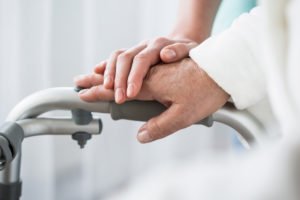
According to the Administration for Community Living (ACL), 2.5 million residents in nursing homes to date suffer from abuse of some kind while under the care of a caretaker. If you or a loved one suffered at the hands of a caretaker or nursing home institution, you can pursue compensation for your losses as well as justice from those liable parties. The team with Ben Crump Law, PLLC can clarify your legal rights and the course of legal action that may allow you to recover your losses.
To start building your case against a liable party, you can reach out to the team with Ben Crump Law, PLLC at (800) 712-9119.
Nursing Home Abuse In Denver, Colorado
Nursing home abuse in the Denver, CO area can take on many forms. Physical abuse is the most obvious of all the forms, as it tends to leave evidence that can be seen and documented. Financial abuse, too, makes itself clear if you are keeping an eye on your loved one’s purchases and bank accounts. Mental and emotional abuse are more difficult to identify, as their effects are most often depicted as changes in a nursing home resident’s behavior.
Some of the clearest signs of abuse you will want to watch for in a loved one in a nursing home include:
- Bruises
- Broken bones or fractures
- A resident’s lowered self-esteem
- A new tendency to withdraw from conversations or social interactions
- Avoidant behavior
- Little or no eye contact
- Abrupt bouts of depression or anxiety
- Self-injury
- Mood swings
- Difficulty sleeping
- Changes in eating behavior
Note that if it is appropriate for you to do so, you may also want to keep an eye on your loved one’s finances to prevent financial abuse.
You should also be wary of negligence as a form of abuse. Negligence can generate many of the same symptoms as mentioned above, including injury. If a nursing home caretaker neglects a resident in their care, that resident can suffer from bedsores, broken bones, and destructive mental health conditions for an extended period of time without being able to communicate their position.
For a free legal consultation with a nursing home abuse lawyer serving Denver, call (800) 921-7227
Should You Work with a Denver Nursing Home Abuse Lawyer?
A Denver nursing home abuse lawyer can make the process of understanding what happened to your loved ones while under the care of a caretaker simpler. Together, you can begin to build your case and establish what compensation you may be owed for your losses.
There are several ways to pursue a legal case against a party that may have wronged a loved one living in a nursing home. You can pursue compensation outside of the courtroom, or you can file a complaint. If the party that may be liable for your damages does not seek responsibility for those losses outside of court, then a complaint can help you bring your case to the attention of a court in your area.
To craft a complaint, you must identify the party you believe to be liable for your losses, elaborate on why you believe that party to be liable with an argument based in evidence, and then establish your predicted compensation and the calculations that led you to such an estimate.
In getting started, you may want to return to the scene of your loved one’s incident and examine it for evidence of a party’s liability. Evidence that you can submit to a court includes:
- Police reports from the nursing home or other, equivalent reports detailing the abuse as it was reported to the appropriate professionals.
- Medical reports detailing the injuries a nursing home resident sustained while under the care of their caretakers.
- The testimony of the abused witness.
- Eyewitness testimonies detailing the treatment of nursing home residents.
- Physical evidence, including bruises, broken bones, or other signs of abuse.
With your case established and liability backed by the aforementioned evidence and more, you can then begin to calculate what compensation you and your loved one may be owed as a result of your losses.
Negotiating Settlements On Your Behalf
You do not always have to take a nursing home abuse case to court. A Denver nursing home abuse lawyer serving the Denver area can instead help you look over any settlements that a nursing home puts forward independent of a court. This way, you can determine whether or not an offered settlement can meet all of your needs. If the settlement appears to be insufficient, you can then request that the attorney you are working with continue to negotiate on your behalf or help you file a complaint with your local court.
Reducing Your Financial Stress
Removing your loved one from an abusive nursing home environment is the most important thing you can do after that abuse has been revealed. You may find yourself subsequently concerned about your finances, should you want to pursue legal action against the institution or individual who caused your loved one harm.
Ben Crump Law, PLLC anticipates this and works to make justice affordable for everyone. The team works on contingency, meaning that you will not receive a bill for the services you benefit from unless or until you receive compensation for your losses. According to the American Bar Association, a contingency-based law firm can request between 33 and 40 percent of an offered settlement when working on contingency instead of paying out of your savings. This way, you can continue to use your consolidated resources to care for your loved one and otherwise ease your own recovery from this traumatic experience.
Denver Nursing Home Abuse Lawyer Near Me (800) 921-7227
A Denver Nursing Home Abuse Lawyer Can Help Your Family Recover from Unexpected Trauma
If you or a loved one suffered at the hands of a negligent caretaker in a nursing home, you do not have to pursue justice on your own. The team with Ben Crump Law, PLLC does not back down from challenging cases. With the help of an attorney, you can better understand what your legal rights are after these incidents, who can be held liable for your losses, and what compensation you may pursue.
To start your fight for justice, you can reach out to the team with Ben Crump Law, PLLC at (800) 712-9119 today.
Call or text (800) 921-7227 or complete a Free Case Evaluation form








